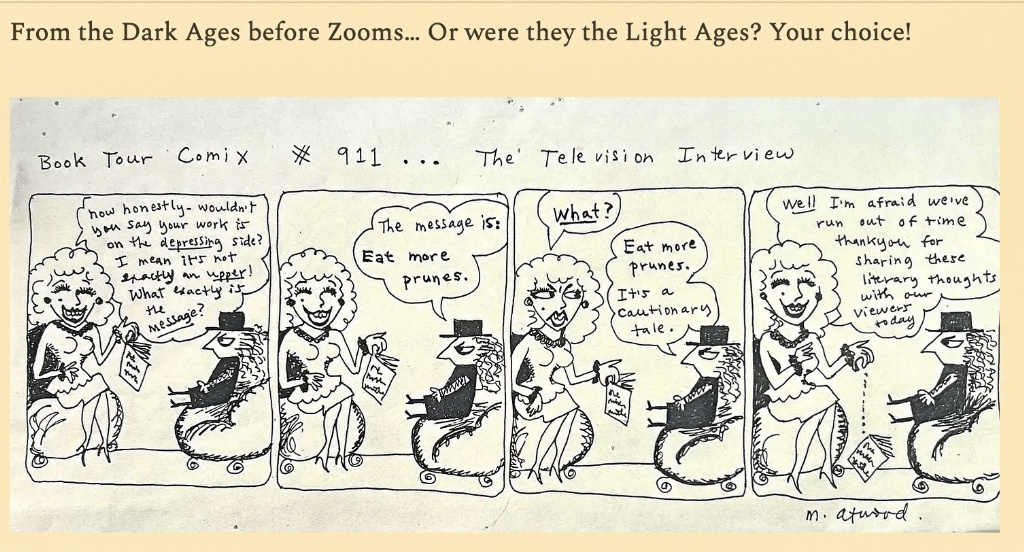Climbing to the Moon
Ladders to the Moon of AGI, by @Code_of_Kait
How a Generative AI represented the idea (popular with some of the machine-learning crowd) that extending LLMs will — somehow —get us to AGI (i.e. ‘super intelligent’ machines) one day. Thanks to Gary Marcus for the pic.
Quote of the Day
“Safety is no accident.”
- On a notice seen at the entrance of a large industrial plant the other day.
A brilliant – and astute — slogan.
Musical alternative to the morning’s radio news
Randy Newman | You’ve Got a Friend in Me
Long Read of the Day
The Data Delusion
Nice New Yorker review essay by Jill Lepore. Given that we seem to have uploaded everything anyone has ever known onto a worldwide network of machines, she asks, what if it doesn’t have all the answers?
Forget the zettabyten Internet for a minute. Set aside the glowering glass jars. Instead, imagine that all the world’s knowledge is stored, and organized, in a single vertical Steelcase filing cabinet. Maybe it’s lima-bean green. It’s got four drawers. Each drawer has one of those little paper-card labels, snug in a metal frame, just above the drawer pull. The drawers are labelled, from top to bottom, “Mysteries,” “Facts,” “Numbers,” and “Data.” Mysteries are things only God knows, like what happens when you’re dead. That’s why they’re in the top drawer, closest to Heaven. A long time ago, this drawer used to be crammed full of folders with names like “Why Stars Exist” and “When Life Begins,” but a few centuries ago, during the scientific revolution, a lot of those folders were moved into the next drawer down, “Facts,” which contains files about things humans can prove by way of observation, detection, and experiment. “Numbers,” second from the bottom, holds censuses, polls, tallies, national averages—the measurement of anything that can be counted, ever since the rise of statistics, around the end of the eighteenth century. Near the floor, the drawer marked “Data” holds knowledge that humans can’t know directly but must be extracted by a computer, or even by an artificial intelligence. It used to be empty, but it started filling up about a century ago, and now it’s so jammed full it’s hard to open.
From the outside, these four drawers look alike, but, inside, they follow different logics…
Once I read that para, I was hooked. Maybe you will be too?
AI and hegemonic anxiety
Yesterday’s Observer column:
The Bible maintains that “the race is not to the swift, nor the battle to the strong”, but, as Damon Runyon used to say, “that is the way to bet”. As a species, we take the same view, which is why we are obsessed with “races”. Political journalism, for example, is mostly horserace coverage – runners and riders, favourites, outsiders, each-way bets, etc. And when we get into geopolitics and international relations we find a field obsessed with arms “races”.
In recent times, a new kind of weaponry – loosely called “AI” – has entered the race. In 2021, we belatedly discovered how worried the US government was about it. A National Security Commission on Artificial Intelligence was convened under the chairmanship of Eric Schmidt, the former chair of Google. In its report, issued in March of that year, the commission warned: that China could soon replace the US as the world’s “AI superpower”; that AI systems will be used (surprise, surprise!) in the “pursuit of power”; and that “AI will not stay in the domain of superpowers or the realm of science fiction”…
A new arrival!
Hooray! David Aaronovitch is on Substack. I have never subscribed to the London Times, partly because I don’t believe in supporting Murdoch properties. And the only thing I regretted about that abstinence is that I didn’t see David Aaronovitch’s columns.
But now he’s a free man, with his own Substack blog. And he’s made a good start.
Like this:
It took 50 minutes……
…after I had posted my first ever Substack here for an email to arrive from someone telling me why he had unsubscribed. He was so quick he might even have placed me in temporary danger of having a unique subscription summary of minus one. “On reading the first post”, he told me, “I’m out of here”. He then explained why. And because everything is grist to the writer’s mill this exchange got me thinking and what it got me thinking is set out below and in tomorrow’s post. In the meantime let’s call my interlocuteur Adam – after the first man to leave paradise.
Adam’s reasoning
I’ll try to be succinct. In a short passage in that long first piece I referred disparagingly to the campaign by professor Matthew Goodwin to persuade the world that the small boats are the make or break issue for the next election. For Adam this represented “the usual snide remarks about Goodwin’s polls, as you prefer to go by Yougov, that much loved poll by all left of centre commentators… (which) knows how to get the replies that you people of the left want, by simply polling the higher educated class which veers leftward. So I’ll be unsubscribing.”
Read on.
My commonplace booklet
From Margaret Attwood’s Substack. Nicely captures the sad fact that book tours are the penance that best-selling writers have to pay for their success.
This Blog is also available as a daily email. If you think that might suit you better, why not subscribe? One email a day, Monday through Friday, delivered to your inbox. It’s free, and you can always unsubscribe if you conclude your inbox is full enough already!


